Behringer adds the Pro-16 to its growing list of completed prototypes
In a Facebook post Behringer reveals their clone of the Sequential Prophet-5 that they’ve taken all the way to 16 voices – here comes the Pro-16.
Pro-16
Behringer has already cloned the Sequential Pro-One, and so the legendary Prophet-5 was always on the cards as one of the synths they were likely to tackle. I imagine it was probably requested by fans as much as the Jupiter-8 which they revealed yesterday. With the Pro-16 they appear to have matched the layout, style and possibly even the knobs of the original. Pushing the voice count up to 16 is definitely something that people have been crying out for and Sequential came in for a little bit of criticism when they released the Rev4 of the Prophet-5 and Prophet-10 for not taking the voice count further. Adding voice cards is not always that easy to do with analogue synths and I guess the polyphony of the Pro-16 is going to be down to Behringer’s minimisation technology where they’re able to build polyphonic synths in a very small space.
It’s difficult to say exactly what’s in the synth at this stage and if there are any differences or enhancements. There does appear to be an extra triangle waveform on Oscillator A. There does appear to be a knob in the same place the Rev4 Prophet-5 has the “Vintage” knob and the button in the filter section could indicate that they’ve followed Sequentials lead into offering two different filters.
However, there will inevitably be protests because Sequential recently brought the Prophet-5 and Prophet-10 back to life and so the cloning of a current product never feels quite as awesome as the resurrection of a long-dead synth. There are many views on the subject that get played out in the comments of every announcement. The price is rumoured to be around £800 which when compared to the current price of a Prophet-5 at just over 3 grand does give you pause for thought, and the unfortunate realities of business and product encroach on our desires to be groovy and awesome musicians who shouldn’t have to worry about such things.
“We’ll make them all”
A slightly unnerving statement of intent from Behringer on Facebook that they intend to make pretty much every synth that ever was. It feels somehow mad or awesome or maybe a little weird that our synthesizer history is going to be homogenised into 3 forms of mass-produced machines. First, you’ve got the Model D/Neutron desktop and Eurorack format and they’ve already released their Pro-1 in that format. Then there’s the Poly-D/MonoPoly flip-up style with the keyboard and finally the polysynth format that started with the DeepMind and is continuing through the UB-Xa, PolySix, PPG and now the Pro-16. Isn’t part of the attraction of an electronic instrument in the shape and physicality of it? Is something lost if they all largely look and feel the same? Maybe, but then, on the other hand, look – synths!
It’s not entirely true though because we already have Behringer synths that don’t fit the mould like the Odyssey, 2600 and MS-1 so hopefully there’s some room for a bit of imagination.
So, for you, is Behringer’s mission completely awesome or is there a danger of synth fatigue? What happens when we end up having every synth we ever dreamed of? Lets us know in the comments.
More information from Behringer
- Sequential Prophet-5: Sequential
19 responses to “Behringer adds the Pro-16 to its growing list of completed prototypes”
 4,6 / 5,0 |
4,6 / 5,0 | 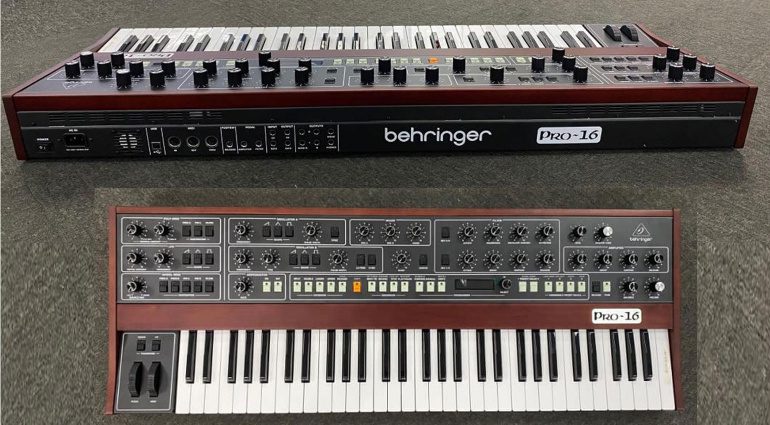

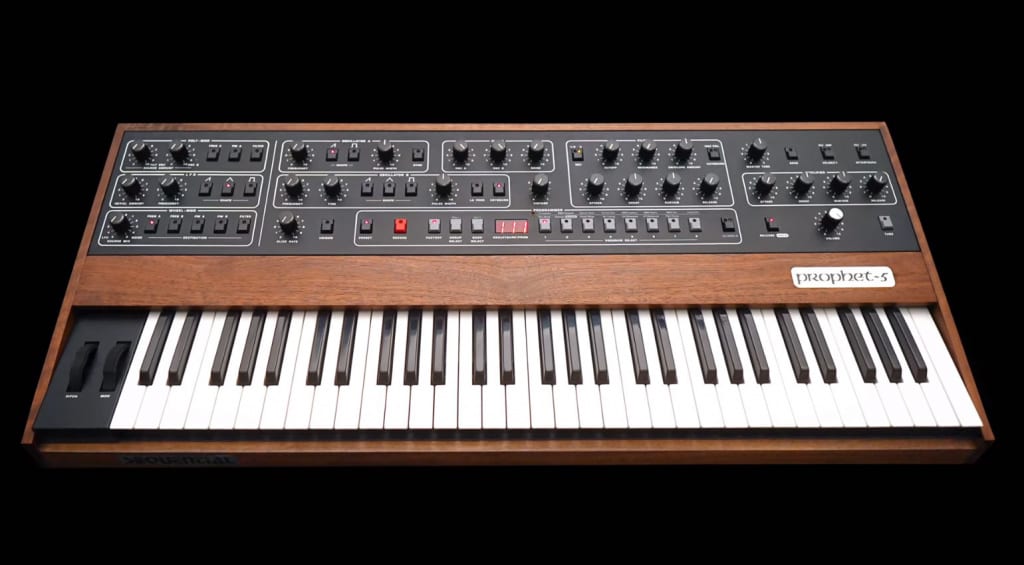
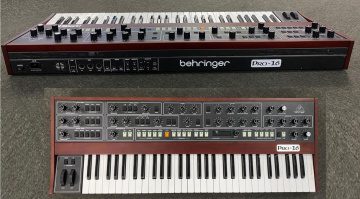

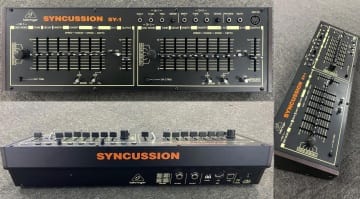

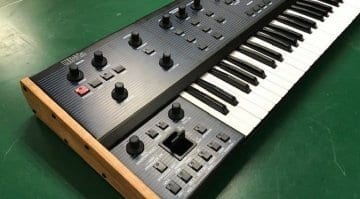
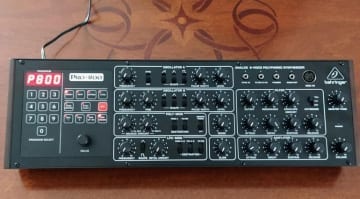
I love you robin. And I’m sorry to do this. It’s a lame move. But all music blogs do this.
A company is a singular, not a plural. So Behringer is not described as ‘they’, but ‘it’. Not ‘are’, but ‘is’.
As in: behringer is out of order for doing this. It should not be building products comparable to extant synths made by other companies.
Sorry! Could you pass on n this advice to peter kirn at CDM too? But I think he’d appreciate calling behringer ‘it’, which seems apt beyond just being grammatically correct. He always gets this grammar point wrong – but gets everything else right.
Actually my friend it’s a Gearnews style choice to address a company as you would a person. So when I write I always call the company “Bob” in my head so that I’m consistent in my use of pronouns. It’s the opposite when I write for Sound On Sound. Update: As it happens i’m only half right and I apparently I should be using “its” not “theirs” – I’ll do my best to correct that 🙂
A company, if it’s more than a one-man company, is made up of people and people should be addressed in plural: “they”, “them”, etc.
An “it” cannot engineer musical instruments, but a team of engineers of can pull that off, hence “they”.
Where’s the UB-Xa? Feels a bit like Uli is trying to hurt competitors by getting people to wait for his promises and not buy allready existing, but much pricier than his planned stuff you CAN’T buy, synths… 800 Euro’s for a Prophet 16 with patch memory… is he saying his Poly D is overpriced? I own a Deepmind 12 and a new Prophet 5 and the Deepmind can sound great but the Prophet is an instrument that inspires me… Deepmind is for sale now.
Are you aware of the world-wide short suply of chips/ICs/DACs and other important components?
I, like the honest few on various comment boards, am full of nothing but praise and admiration for Behringer’s synth-ethic!! I will never be able to afford, for example, a PPG WAVE!! The prices asked for the few advertised examples are way out of my financial universe! Does that mean then that I’m not entitled to experience the, imho, wonderous sounds this iconic synth could bring to my home studio? Same goes for the announcement of the “16”! I simply couldn’t justify spending the money for a Rev 4! But I most certainly COULD justify spending a third of that on the newly “announced” Behringer! The only downside is whether I’ll still be around when they release it! 🤣
There’s no “danger of synth fatigue” because there already are a sh*t ton of synths. Samething with any other piece of music related gear. Tons and tons of “inspired by” (cough nearly exact copies cough) Strats, Teles and LPs. And the thousands of Tube Screamers.
Behringer is doing what any smart business does. They prospect the market and offer what the possible costumers desire at a more affordable cost.
Like in any walk in life, if you can’t compete, or – hello Roland, Yamaha and Korg (for the most part) – if you are unwiling to satisfy your costumers demand, then stand aside.
If people ask a company to re-release a specific piece of gear and what you get in return is a “we don’t chase ghosts” as a retort, plus some fiddly dumbed down toy you need tweezers to play with, that’s all on them.
So go Behringer. Do them all. Give people what they desire.
Just like this
I’ve been listening to electronic music since 1974 when I heard Kraftwerk’s “Autobahn.” Analogue synthesis has largely been the domain of the rich, the well-heeled, or people having access in them in institutions. The patents on the majority of these devices being “cloned” (improved, frankly) is a great develop on its own, but making them this affordable is a very big deal. I don’t care if someone no longer feels so special being one of the few to own a VCS3, or a rapidly decaying Minimoog. It all sounds feudal–let’s call them the “gearistocracy,” it fits. Why wouldn’t any artist or creative person want EVERYONE to have access to these tools if they wanted to? I guess they don’t believe in progress, or much else, a shame.
Behringer….hmmm…..initially one would think that synth aberitions of a namesake would be uninspiring and not in the spirit of the original thus erasing the vintage utility era of these “dinosynths”.
Enter in the arena Behringer’s conceptualization of not only near exact reproduction, but yet adding features that many had ask for or that would essentialze the reproduction to make it even more utilitarian than the original.
My first inclination is dis-belief that Behringer could pull this “cloning” operation off….but after further inspection it is my rendered opinion that Behringer has in fact opened up a whole new world of vintage gear to those who can least afford these wonderful sound and song tools thusly enhancing a “Robinhood Effect” of these vintage artifacts.
I believe it is fair to say that Behringer has made a name for itself in the hearts and minds of many ardent minimalists of equipment hoarding, not to mention those of us who simply desire “old school synth technology” that we may pass on to others on the used market after enjoying the fruits of Behringers labor.
All of a sudden….ther is hope of a new day…
In the World of Vintage Synthesizers!!!
What is the ethic difference to copy synths at component level as software synths vs making hardware synths of the same machines?
Interesting with the P16, UB-X and Jupiter. If Behringer nail the sound and some of the experience of the originals it would be great to many potential users. Will I buy it? No, I’m too orthodox and purist when it comes to synths and audio. But I can’t deny I lust for some of Behringer’s upcoming clones…
I think Behringer do an awesome job of convincing people that couldn’t tell whether what they made sounded like the original or not that if you bought Gary Numan’s synths, or at least their version of it, they could BE Gary Numan. Trouble is, the synths that Gary played didn’t make him Gary Numan. He already WAS Gary Numan!
You know… talent.
“groovy and awesome musicians who shouldn’t have to worry about such things”
We dont get to live in a bubble and really, probably shouldnt be allowed to either. Everything we buy has a knock on effect somewhere. Mindless consuming is a bit of an issue in the world.
This whole article and all the comments just prove one thing: that Behringer is WINNING. Whether you like them or not, they are benefiting from both those who are bashing them, as they are from those praising them. At the end of the day, they are selling the most synthesizers, therefore their place in the market is justified.
There is a distant downside to Behringer’s clonings. In ten years, every synth that ever was will have been remade in big numbers, and there’ll be nothing much left to discover in terms of retro hardware, for newbies to electronic music. However, the plus side is that all these clones will keep the originals alive for another 50 years or so, and the money made from the clones may go into some new designs and instruments. Personally, I’m glad they’re doing a 16 voice Prophet clone rather than 8. For me, it’s overkill, but for a good keyboardist it’s a dream come true if it costs £800.
cloning still requires a lot of work, time, money… matching available and manufactured components recreating existing circuits of yesteryears… sounds like easy money but there’s still a lot of room left for improvements too. doubling. tripling voices doesn’t mean a lot if you haven’t added full midi implementation or opened all parameters to program changes or full midi control (and added memory). recreating something and not taking it that extra step adding everything the modding community has contributed/found and then not adding possibilities your matchup of/and component list might introduce… well, that’s just shit! don’t just copy it, make it your own version! but, in having said that, uli if you’re listening; I’d kill for a 64 voice sidstaion/hardsid! not kill just buy immediately from thomann’s I meant…
down to my last sid. and, scouring the net for 64’s to scalpel, it’s just wrong! clone a SID uli! the SID must be cloned! clone the SID!
I love experimenting with these synth clones , having access to more synth designs than I normally would have , has helped me learn about differences between the synthesizers. Now they have distinct personalities .
I just got a Cat and I was at first overwhelmed by it’s weirdness, but I’m starting to find things I like in it .
I’m not a real musician , I have turned to experimenting with sonics to satisfy my synesthesia . I Love collecting records and I am physically affected by sound , Playing with oscillators is like having and endless possibility of sensation .
Annoying grammar guy:
Don’t be a grammar douchebag.
Right?
I own a reissued prophet 10 rev 4 and OB-X8. I was a user of the originals when they came out. I wanted to recapture my youth I suppose by laying out the cash to obtain these synths new rather than pay vintage prices and risk repairs and failures either on stage or in the studio. The prices of these vintage synths(prophet 5, OBXa. Jupiter 8, CS80, mini moog etc) in their original form have gone through the roof. Having an opportunity to buy these from behringer, especially if they sound the same, are reliable, and are affordable for many more musicians…. It’s a good thing.